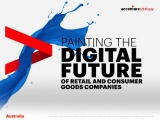
Many Australian consumers would allow companies to collect their personal data via intelligent devices in return for a better experience or financial reward, according to a new report on digital retail shopping trends.
According to the report, from professional services firm Accenture, nearly a third — or 32% — of Aussie consumers would allow collection of their personal data, and another 32% say they would subscribe to a service that constantly looks for the best pricing deals on their behalf, and actively recommends which company to switch to, and when.
The study, which looked at the future for the retail and consumer goods industries, identified current consumer appetite for new purchasing experiences and the business models that have the highest potential to unlock new value.
Accenture says the retail and consumer goods industries will change more in the next 10 years than they have over the past 40 years.
And, the firm says one primary force is "responsible digitalisation" – and it has already begun.
{loadposition peter}According to Accenture, a "digital wave" is underway in Australia that could bring a cumulative $3.94 trillion in operating profits by 2025 for the retail industry.
Accenture sees four main drivers of success – actions it says leading companies can take through 2025 that are critical for consumer companies.
"All are powered by digital, the key tool industry leaders will use to transform themselves for the next decade and beyond," the company says.
In the study released on Thursday, in addition to allowing their data to be collected, 20% of Aussie consumers surveyed say they would use sensor-based digital services that pre-emptively address their needs without human intervention.
And another 18% indicated they would subscribe to brands that analyse their shopping history to select products especially for them, and orders them automatically.
But, according to Accenture, to reach the next frontier of digital commerce, Australian retailers and consumer goods companies need to explore the a number of “transformative business models” which they say are already being welcomed by Australian consumers, including:
- Sharing economy (the next-generation rental market) – Convenience and experience over ownership, at a fraction of the price. 36% of Australian consumers said they would use a rental subscription for clothing, renting an item for an occasion and returning it after, instead of purchasing it outright.
- Personalisation economy ("surprise me" subscriptions) – Expertly curated products tailored to the individual and automatically delivered. 31% percent of consumers said they would use this subscription for clothing, where an expert personally selects items they might like based on previous purchases.
- Replenishment economy (auto-replenishment) – Smart sensors detect when a product is running low and automatically re-orders and delivers it. About 49% of consumers would use auto-replenishment for household goods like detergent. Another 44% would consider it for fresh food items.
- Services economy ("do it for me") – Services are outsourced so someone else does the heavy lifting. A third (33%) of consumers would use this service for their laundry – pick-up, wash-and-fold, and delivered back to their door.
The Accenture report cautions that, as a by-product of industry transformation, there is potential disruption for people and society which companies, policymakers and regulators need to actively address, including:
- Minimising impact on local communities – With an increasing number of retail stores downsizing or closing due to the rise of digital commerce, local communities need to respond by businesses and government establishing economic development strategies and partnering with communities to repurpose physical space as hubs for experiences, leisure and lifestyle activities.
- Reskilling the workforce – Emerging technologies will drive a range of efficiencies which will significantly change the nature of the industry’s workforce. Business leaders and policymakers must focus on accelerating reskilling people, creating partnerships with educational institutions, and influencing public policy to meet the needs of the future workforce.
- Ensuring sustainability – Meeting consumer demand for rapid delivery needs to be achieved in parallel to minimising environmental impact. Shifting to electric vehicles and exploring load-sharing can help while also enhancing delivery efficiency. Furthermore, innovation in packaging design and supporting recycling infrastructure is also critical, helping to build a more circular economy.